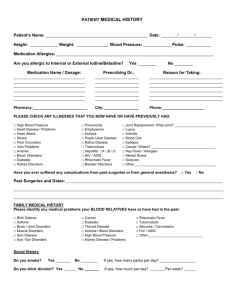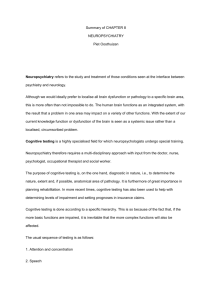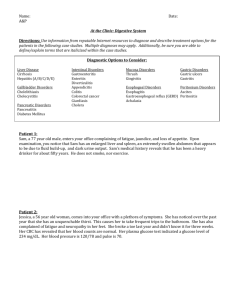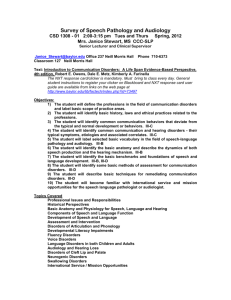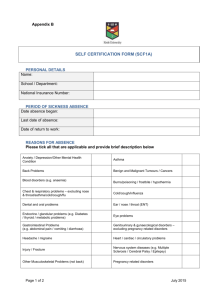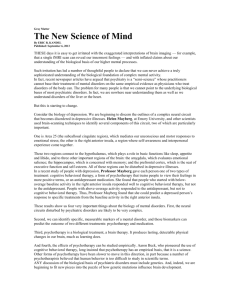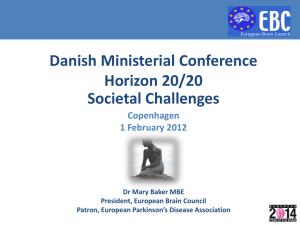Cognitive Linguistic Communication Disorders
advertisement
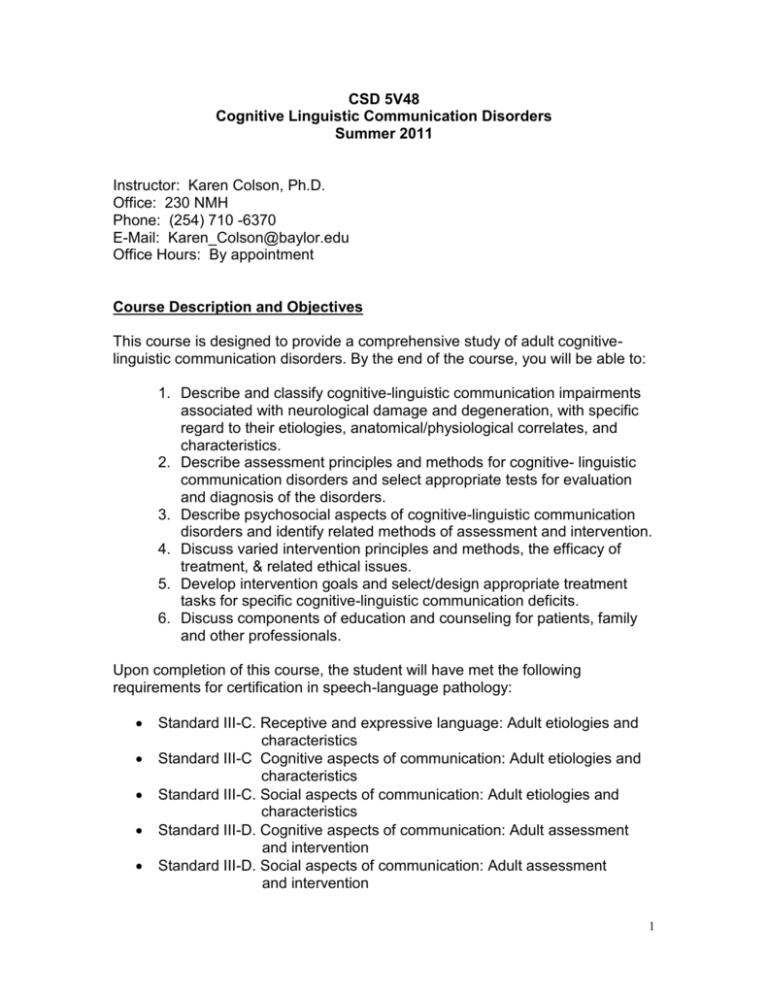
CSD 5V48 Cognitive Linguistic Communication Disorders Summer 2011 Instructor: Karen Colson, Ph.D. Office: 230 NMH Phone: (254) 710 -6370 E-Mail: Karen_Colson@baylor.edu Office Hours: By appointment Course Description and Objectives This course is designed to provide a comprehensive study of adult cognitivelinguistic communication disorders. By the end of the course, you will be able to: 1. Describe and classify cognitive-linguistic communication impairments associated with neurological damage and degeneration, with specific regard to their etiologies, anatomical/physiological correlates, and characteristics. 2. Describe assessment principles and methods for cognitive- linguistic communication disorders and select appropriate tests for evaluation and diagnosis of the disorders. 3. Describe psychosocial aspects of cognitive-linguistic communication disorders and identify related methods of assessment and intervention. 4. Discuss varied intervention principles and methods, the efficacy of treatment, & related ethical issues. 5. Develop intervention goals and select/design appropriate treatment tasks for specific cognitive-linguistic communication deficits. 6. Discuss components of education and counseling for patients, family and other professionals. Upon completion of this course, the student will have met the following requirements for certification in speech-language pathology: Standard III-C. Receptive and expressive language: Adult etiologies and characteristics Standard III-C Cognitive aspects of communication: Adult etiologies and characteristics Standard III-C. Social aspects of communication: Adult etiologies and characteristics Standard III-D. Cognitive aspects of communication: Adult assessment and intervention Standard III-D. Social aspects of communication: Adult assessment and intervention 1 Required Text Brookshire, R. H. (2007). Introduction to Neurogenic Communication Disorders, 7th ed. St. Louis, MO: Mosby. Course Structure The course will be lecture based with group discussion and use of multimedia resources. It will be organized into four major sections as follows: 1. 2. 3. 4. Neuroanatomy and neuropathology Right hemisphere syndrome Traumatic brain injury Dementia Course Requirements You will be responsible for reading the text and all supplemental material assigned and/or handed out during the semester. You will be expected to attend all class sessions and to participate fully in class discussions/activities. University policy on academic misconduct will be followed. There will be three 100-point examinations. Your course grade will be based upon the total points accumulated over the course of the semester. The following scale will be used: Grade Percentage Range Point Range A B C 90 - 100 80 - 89 70 - 79 270 - 300 240 - 269 210 - 239 Extra credit assignments will not be available. University policy prohibits cheating or plagiarizing. Please refer to the student handbook regarding academic dishonesty and policies. Students found cheating or plagiarizing will receive an F for the course and the appropriate Academic Dean will be notified. 2 If, at any time, you have any questions that have not been adequately addressed during regular class meetings, please do not hesitate to set up an appointment to meet with me in my office. Attendance Policy: The attendance policy of the College of Arts & Sciences states: “To earn course credit in the College of Arts and Sciences, a student must attend at least 75% of all scheduled class meetings. Any student who does not meet this minimal standard will automatically receive a grade of “F” in the course. Any University-related activity necessitating an absence from class shall count as an absence when determining whether a student has attended the required 75% of class meetings.” “In the event you are unable to attend a class session, it is your responsibility to obtain (a) class notes from another student, and (b) any changes in the class schedule. You are also expected to take tests on time. If you are ill, it is your responsibility to notify the instructor prior to the time of the test. If you miss a test without prior approval from your instructor, you will be subject to receiving a zero for the test. When returning from the illness, it is the student’s responsibility to take the makeup exam within 3 days or the student will automatically receive a zero for the test.” Disabilities Statement: Baylor University complies with the Americans with Disabilities Act and Section 504 of the Rehabilitation Act of 1973 regarding students with disabilities. Eligible students seeking accommodations should contact the Coordinator for Students with Disabilities. Accommodations are not retroactive. Therefore, students should contact the Coordinator as soon as possible in the term for which they are seeking accommodations. 3 CSD 5V48 Cognitive Linguistic Communication Disorders 2011 Summer Calendar July August 7 Introduction & Chapter 1 Neuroanatomy & Neuropathology 11 Chapter 1 continued 12 Continued 13 Chapter 4 Assessing Cognition 14 Continued & Chapter 6 Assessing Functional Communication and Quality of Life 18 EXAM 1 19 Chapter 10 Right Hemisphere Syndrome 20 Continued 21 Continued 25 Chapter 11 Traumatic Brain Injury 26 Continued 27 Continued 28 Continued 1 EXAM 2 2 Chapter 12 Dementia 3 Continued 4 Continued 8 Issues in Cognitive Rehabilitation 9 Continued 10 FINAL EXAM 4


